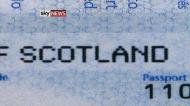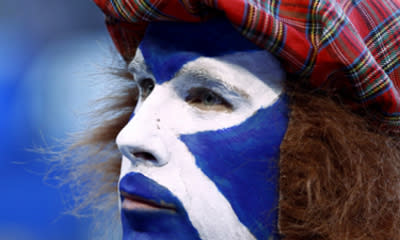The Scottish Nationalists' resounding election victory has put independence top of the political agenda north of the border.
But what exactly would it mean in practice?
Sky's Scotland correspondent, James Matthews, has been looking at how it might work, based partly on plans published by theScottish National Party in its "National Conversation".
Here's his A to Z of Scottish independence:
A is for, what else, but Alex Salmond? William Wallace in a suit, who doesn't need a broadsword for his signature pose, opting instead for the double thumbs-up. (Hollywood take note). B is for business. Scotland would have access to the full levers of government to do business for itself. Economists continue to argue over the benefits, but agree the recent performance of small near-neighbours like Iceland, Norway and Ireland offers little encouragement C is for Customs posts on the border between Scotland and England. Contrary to some expectations there would not be any, reflecting freedom of movement within the EU. D is for dual citizenship. The SNP vision is that Scots could hold aScottish passport but remain a citizen of the remaining British Isles (assuming Westminster agrees). Eligibility for a Scottish passport would be down to birth, ancestry or residency. E is for exports to Britain, worth around £30bn a year. An independent Scotland would still want the remaining British Isles as its main trading partners. The SNP says the key difference is that it would be a "partnership of equals".
F is for Force, as in Scottish Defence Force. It would be Scotland's army, possibly around 20,000 strong, which would be more concerned with defending Scotland's territory than conducting wars overseas. Scotland would be a Nato ally, but not a member. G is for Green Card. The SNP has floated the idea of a US-style Green Card for non-Europeans which, it claims, would help Scotland compete for highly-skilled workers.
H is for history and its rapidly changing course.
I is for independence in Scotland, which would be making a renaissance after it disappeared in 1707 with the Act of Union. J is for jobs. The SNP says there would be more of them in an independent Scotland, which is why they say they'll put jobs and the economy at the heart of a 'Yes' campaign in the forthcoming referendum.
K is for Keith O'Brien, Cardinal and leader of Scotland's Catholics, who would be happy with Scottish independence. "It's difficult to argue that ecclestiastical independence is acceptable but political independence is not," he says.
L is for language, namely Gaelic. Native to Scotland, but spoken by less than 2% of the population, it would be boosted by independence. A specific pledge is to provide a strengthened Gaelic service on television in Scotland.
M is for majority. With 69 seats in the Scottish Parliament, the SNP has the numbers to introduce an independence referendum and, with the campaigning skills it demonstrated during the election, who would bet against the Nats winning it? N is for niggling issues that cast a shadow over independence. Take sectarianism in the west of Scotland, for example - does it become a bigger problem as its host country gets smaller? Or does change provide an impetus for leaving old problems in the past?
O is for oil from the North Sea, which along with gas is currently worth roughly £13bn annually to the UK Treasury. It would belong to Scotland, notwithstanding any legal challenge on whether or not the oil and gas reserves are actually in Scottish territorial waters.
P is for pound sterling, which could be phased out for the euro. Any change would be put to Scots in a separate referendum.
Q is for the Queen. She would remain as Head of State. R is for renewable energy, another key economic driver. Alex Salmond wants wind and waves to deliver all Scotland's electricity needs by 2020 and to sell what's left to the world.
S is for 'Scottish Broadcasting Corporation'. This would be on the Channel One button - it would evolve from the existing BBC Scotland and be more Scottish. Nightly news on Channel One, for example, would be with Scotland's own Jackie Bird, not Huw Edwards. Scottish stories would be a priority, not an afterthought.
T is for other TV matters. Scots would still be able to digitally access telly from everywhere else. The Scottish Government would make its own decisions on which events to keep on 'free telly', such as Scotland football matches.
U is for United Nations. Scotland would be a full member, with its own diplomatic team in New York and its own foreign policy. V is for voting in an independent Scotland, which could get complicated. Do the Unionist parties campaign on an independence-reversal ticket?
W is for Washington DC, one world capital where Scotland would have an embassy. Scotland wouldn't have a diplomatic mission everywhere, but would concentrate on countries which presented commercial opportunities, like those within the Scottish diaspora.
X is for xenophobia. There is the theory that, once having gone it alone, those Scots who are hostile would feel less uptight about the neighbours, particularly their nearest one.
Y is for the youth vote. The SNP intends to give people the vote from the age of 16.
Z is for zero-tolerance of nuclear weapons. Under the SNP, Scotland wouldn't have any. It currently does at the Faslane Naval Base, home to the UK's nuclear submarine fleet. 



No comments:
Post a Comment